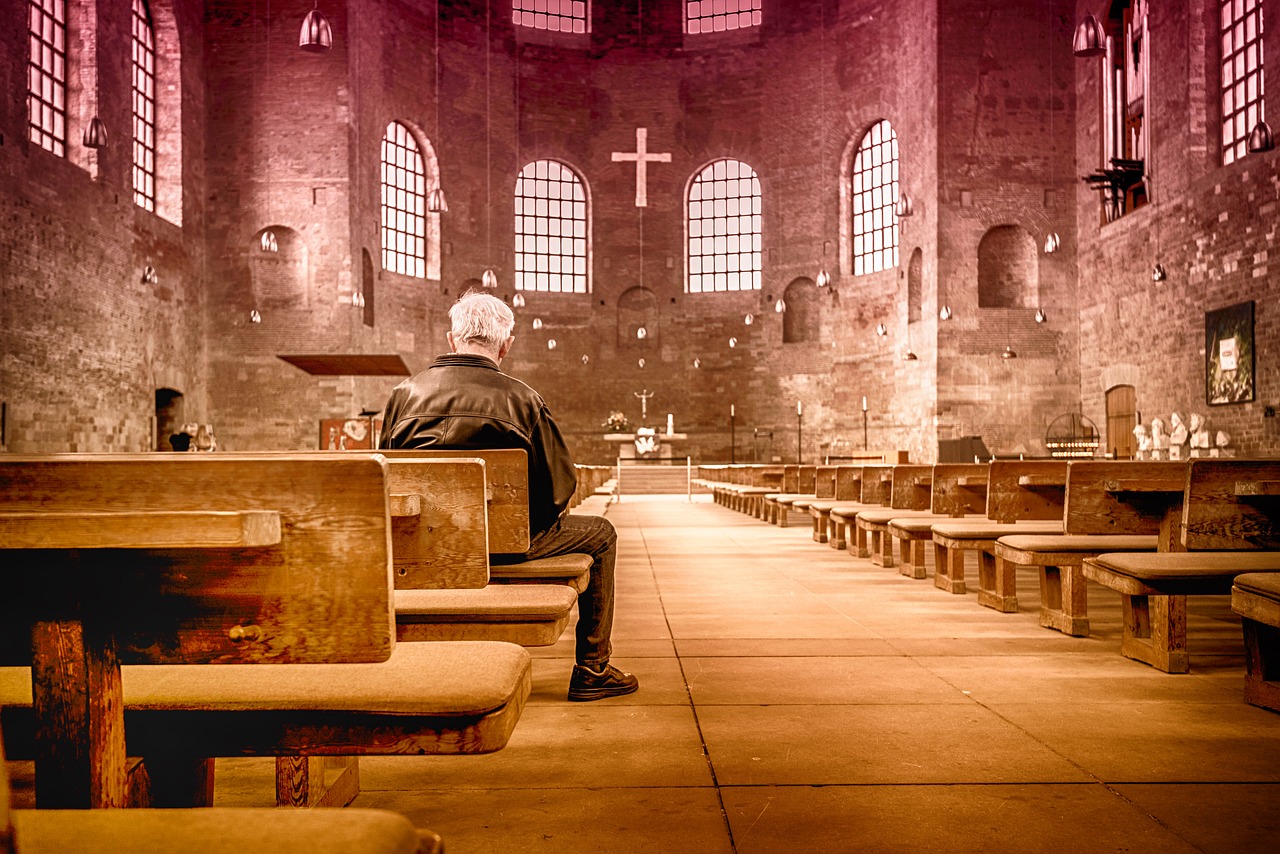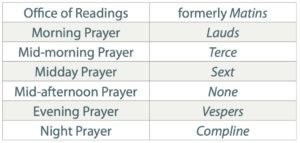
The Liturgy of the Hours, also known as the Divine Office, is the collection of daily prayers of the universal Catholic Church. Required of the clergy and recommended for the laity, this official prayer book of the Church divides each day of the year into seven different “hours,” or times of prayer, each with a Latin name:
Each “hour” is assigned its own set of psalms, hymns, Scripture readings, and prayers. Each day also includes an introductory prayer, the Invitatory, and writings by Church Fathers or saints (the Office of Readings or “Lessons”). Over the centuries, all of these thematic elements have been meticulously chosen and brilliantly arranged by the Church. The Hours parallel the seasons and feasts of the Mass, thereby diffusing the praise and thanksgiving of the Mass throughout the entire day.
The Hours are Deep in History
“The Holy Ghost and the Church have been working on the Breviary for over 3,000 years. It [is]… a precious common fund to which the great men of prayer from every age have contributed their thoughts and sentiments.” – Pius Parsch, priest & liturgist, 1940
By cycling through the Psalms, the Hours find their origin in the Jewish liturgy. This ancient tradition of reciting the Psalms – “Seven times a day I will praise you” (Psalm 119) – was preserved and passed on by the Apostles, thus becoming the foundation of the Christian liturgy as well. Hymns were added to the Church’s daily prayers in the fourth century when St. Hilary, inspired by songs that he heard during his exile, suggested the use of hymns to combat the heresy of the Arians. St. John Chrysostom and St. Ambrose enthusiastically followed their friend’s advice and thereby became the first hymn writers of the Catholic Church. Future saints and pontiffs later took up their own pens, creating new hymns to commemorate Scripture, develop Church doctrine, and celebrate new feasts.
The Hours are Deep in Faith
“Since to the chant of the hymns and the psalms the Divine Office is celebrated, there is accomplished in the Church of God a public ministry, organized for the good of all.” – St. Thomas Aquinas
The purpose of the Hours is twofold: Through the voice of the universal Church, it presents the prayers and needs of the body of Christ, yet it also serves as a beacon that guides our individual spiritual growth. The Hours illuminate the Faith of the Church and invite us to deepen the content of our personal prayer. Its psalms and hymns encourage an evangelical fervor; its readings solicit solemn reflection, and its prayers and intercessions precipitate penance as well as praise.
The Hours are Deep in Christ
“What lights are obtained from the divine words! With what holy maxims is the soul penetrated! How many acts of love, of confidence, of humility, of contrition, may one not make by merely paying attention to the verses.” – St. Alphonsus Marie de Liguori
The Hours give us a unique opportunity to journey with Christ, while also offering our prayers to Him. Our Lord Himself recited and prayed the psalms within its pages. We encounter the life of Christ, and grace, in its Scriptures and express our love for Christ and His Father in its songs and prayers. Moreover, the story of the Crucifixion directly references the hours into which the Divine Office is divided. And sharing the exact same prayers with the entire Catholic Church on earth unites us with all our brothers and sisters in Christ across time and space.
While the length and content of the Hours can seem intimidating, it need not be prayed (by laity) in its entirety every day. And although labeled as hours, each “hour” averages only 10-15 minutes of prayer time. So, perhaps select only one hour to pray each day, such as Lauds or Vespers, and then add to that if time allows. Or, pray a different hour each day of the week. Several online sites offer free ver- sions of the Hours, whether written, recited, or sung.
The Hours were meant for all the faithful in all ages of the Church. It is the same set of prayers that was carried on parchment by the Knights of the Cross in the Middle Ages. It is the same book that Mary Queen of Scots took with her to her execution and in which St. Teresa of Avila scribbled her poetry. It traversed Italy’s hills and caves with St. Benedict and his monks, and it crossed oceans with missionary priests like St. Damien of Molokai (who managed to save his in a near-drowning incident). And today, it is the same set of prayers tucked inside a worn briefcase carried by Pope Francis, everywhere he goes. Just as the body of Christ is broken and shared in the Mass, the heart of the Church’s prayer life is broken open and shared in the Hours. With its outpouring of grace and wisdom, it is the Church’s gift to us, and how we celebrate it is our gift back to God.






